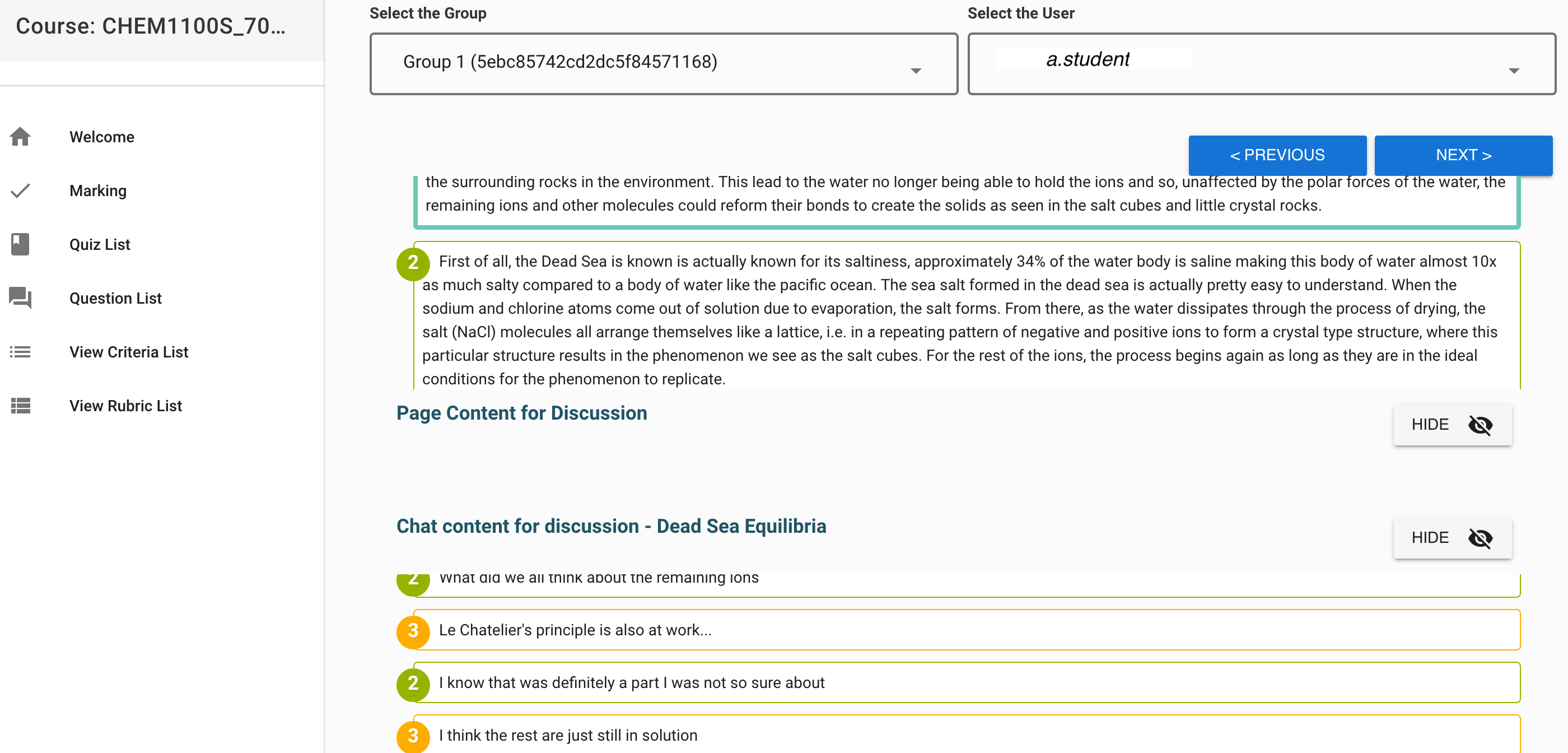
Think.Chat.Learn is a real-time, chat-based, peer learning tool. Peer discussion in small groups is widely recognised as a key driver of learning in both face-to-face and online learning environments. Small-group student discourse supports the development of higher-level thinking and communication skills such as reasoning, explanation, co-construction of evidence-based arguments and reflection. It is often difficult to engage students effectively in large classes and even more challenging in blended environments.
Think.Chat.Learn allows teaching staff to:
Individuals’ contributions to the group‘s discussion can be assessed and students provided with feedback about their ability to participate in critical discourse and to collaborate with others to solve a problem.
The platform has a flexible structure that makes it easy for academics to tailor to their course assessment.
The tool facilitates chat-based, guided, small peer discussion around challenging problems or concepts. When students enter Think.Chat.Learn, they are given a high-level quiz question and are asked to select the correct answer and provide written reasoning for their response. They are then allocated to a text-based chat session (number of students in the chat is configurable – three is suggested) where they are able to view each other’s responses and discuss each other’s choices in relation to the question and concepts involved. When the session terminates, students are able to change their initial response and complete a survey of their experience.
Instructional scaffolding is provided to students in the course site in UQ's learning management system.

| Title | First Name | Last Name | Affiliation | Role in the project | Contact |
|---|---|---|---|---|---|
|
Professor |
Gwen |
Lawrie |
School of Chemistry and Molecular Biosciences |
Lead CI |
g.lawrie@uq.edu.au |
|
A/Professor |
Carl |
Reidsema |
School of Mechanical and Mining Engineering |
Lead CI |
retired |
| eLIPSE | Software development team | elipse@eait.uq.edu.au +61 7 334 68018 |
There is now a web-based interface to maximise the efficiency of instructor access to student submissions (hosted in UQ Cloud). Navigation between each student and between different sessions is now fluid.
Successful implementation through Blackboard has been demonstrated in courses across the Faculties of Science and EAIT. Tasks have included co-construction of understanding of concepts using video and question-based stimuli, collaborative discussion of laboratory outcomes, and online workshop discussions.
Through partnership with the UQ Critical Thinking team and US-based ELIPSS team, a flexible assessment criteria rubric has been designed and embedded in the interface. This has been optimised to engage students in critical reasoning.
Resources have been created to support student orientation in tasks, e.g. a ‘Good Chat/Bad Chat’ graphic resource has been developed to set expectations of engagement in conversations. This resource has been informed by the project evaluation data.
Multiple positive impacts on teaching and assessment have been evidenced due to evaluation of each semester’s iteration of course implementations of assessment tasks. Quantitative and qualitative evaluation data are collected sourced from analytics data, student submissions, course surveys, focus group interviews, tutor feedback and student outcomes. The project team then responds to improve functions/features in the tool. Instructors have responded in the instructional design, scaffolding provided for students and modification of assessment criteria.
The outcome is a tool that is flexible and versatile, hosted in Blackboard, able to support fully-online tasks that facilitate student peer interactions. Many students referred to the task as having a positive impact on their learning and skill development, and they valued the opportunity to engage with other students.
A versatile marking interface to optimise the timely provision of marks and feedback to students, with functionality integrated with Blackboard, has been developed.
The following resources are available for users:
Think.Chat.Learn is built on the MOOCchat platform, developed by eLIPSE for the original MOOCchat tool.
LTI, MongoDB, Piwik for analytics.
Think.Chat.Learn represents a further development of the MOOCchat tool. MOOCchat at UQ built on work designed for MOOCs originating from UC Berkeley’s MOOCLab, via an active collaboration of over 2 years with Professor Armando Fox, Director of MOOCLab at UC (Berkeley).
The project was initially supported by an EAIT Teaching and Learning Grant in 2016, led by Associate Professor Carl Reidsema. This version, redeveloped by the eLIPSE development team, featured a new user interface and functionality to enable semantic analysis for chat evaluation for markers.
Further enhancement to create Think.Chat.Learn was funded by a UQ Teaching Innovation Grant in 2019-2020, led by Professor Gwen Lawrie.
Lawrie, G. (2020). Developing Online Collaborative Communities! Interdependency & Assessable Learning Outcomes. #DryLabsDownUnder, Zoom networking event invited presentation, 25 June 2020. (National audience)
Lawrie, G. (2019) Engaging students in large classes in online, collaborative discourse. Teaching Innovation @UQ Showcase, UQ Teaching & Learning Week, 30 October 2019.
Stok, J. & Lawrie, G. (2019). Weaving Webs: Creating instructional interdependency in blended, active-learning environments. Australian Conference on Science and Mathematics Education, University of Sydney, 1-3 October 2019.
Lawrie, G.A. (Invited Keynote, 2019) Sticky Chemistry: Scaffolding student thinking about thinking in hybrid learning environments. 8th European Variety in University Chemistry Education Conference, 17-19 July 2019, Monash Prato Centre, Prato, Italy.